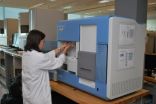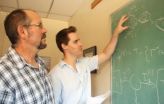URI professor warns: TV viewing likely to make you fear sickness
2010-10-01
(Press-News.org) KINGSTON, R.I.-– September 30, 2010 –Watching television and its heavy dose of medical content in news and drama can lead to more concern about personal health and reduce a person's satisfaction with life according to a new study out of the University of Rhode Island.
The study, authored by Yinjiao Ye, assistant professor of communications studies found that TV viewing affects people's awareness of health-risks and whether they believe they can protect their own health. People develop these perceptions because TV viewing leads them to believe they have a greater likelihood of being victimized by health-risks as well as a strong belief in the severity of those risks. The research was published in the September issue of the journal Mass Communication and Society.
Millions watch medical shows such as Grey's Anatomy, House, and E.R. Evidence has shown that the mass media are powerful in disseminating health knowledge and changing health attitudes and behaviors through such programming. Such knowledge, however, may lead people to think they are more likely to suffer from the maladies presented on TV.
Given that people are predisposed to seek life satisfaction and the benefits of life satisfaction on health and longevity, high doses of television viewing may prevent people from achieving that goal. Of course, life dissatisfaction may be a reason why people watch television to start with, but television is not the best solution according to this and other studies. Other leisure activities such as socializing and exercise may actually be better options.
Since most people learn important information about health risks from the mass media, there is clearly a double-edged-sword effect at work here. As people become more knowledgeable, they enjoy life less. But ignorance, at least of TV's presentations of medical information, is closer to bliss.
These findings extend previous research that TV viewing can also cause people to be less satisfied with their lives because it makes them more materialistic and causes them to overestimate other people's possessions compared to their own. Now getting sick and not being able to do much about it can be added as a second cause of life dissatisfaction.
In her study, the URI professor surveyed 274 students in the College of Communications at the University of Alabama about their TV viewing and life satisfaction. The students were not told the purpose of the survey.
The surveyed students ranged in age from 18 to 31, a youthful group associated with good health and vitality. "While this surveyed group shows dissatisfaction, I suspect that if I surveyed a more general population the dissatisfaction would be even higher," says the researcher.
INFORMATION: END
ELSE PRESS RELEASES FROM THIS DATE:
2010-10-01
A team of chemists from the University of Seville (US) has managed to distinguish between different kinds of tea leaves on the basis of their mineral content and by using artificial neural networks. This technique makes it possible to differentiate between the five main varieties of tea – white, green black, Oolong and red tea.
"This method makes it possible to clearly differentiate between the five types of tea – something that is often not easy to do by eye alone – by using analysis of the leaves' mineral content and then mathematically processing these data", José ...
2010-10-01
Northwestern University researchers have taken another step towards realizing a new class of polymerase chain reaction (PCR) enzyme mimics, opening the door for the development of highly sensitive chemical detection systems that go beyond nucleic acid targets.
The blueprint for building synthetic structures to detect and signal the presence of targets such as small molecule medical analytes (signalers of disease or bodily malfunction, such as neurotransmitters) and environmental hazards, such as TNT, to name just a few, is inspired by biology and its allosteric enzymes. ...
2010-10-01
As researchers and policymakers work toward an effective HIV vaccine in a constrained global economy, cost-effective prevention strategies such as Couples Voluntary Counseling and Testing (CVCT) must take a larger role in efforts to decrease the rates of HIV/AIDS in Africa, says Emory University HIV/AIDS vaccine researcher Susan Allen, MD, MPH.
Allen, who has worked to combat the AIDS epidemic in Africa for more than 25 years, highlighted the value of CVCT and other cost-effective HIV prevention strategies today at the AIDS Vaccine 2010 Conference in Atlanta.
"The ...
2010-10-01
A break in the two chromosomes has given scientists a break in finding a new gene involved in puberty, Medical College of Georgia researchers report.
It's also helped clear up why some patients with delayed puberty have no sense of smell, said Dr. Lawrence C. Layman, chief of the MCG Section of Reproductive Endocrinology, Infertility and Genetics.
The WRD11 gene interacts with a transcription factor that appears to be involved in development of gonadotropin releasing hormones that enable sexual maturation as well as olfactory neurons in the brain, according to a study ...
2010-10-01
Van Den Ende-Gupta syndrome (VDEGS) is an extremely rare genetic disorder that is characterized by distinctive head and facial features, such as unusual eyelids, narrow and beaked noses, flat nasal bridges, jaw deformities, and a turned out lower lip. As part of McGill's "RaDiCAL" project (Rare Disease Consortium for Autosomal Loci), collaborators in Qatar conducted field research with three patients from biologically interrelated Bedouin families, and sent samples to Canada for analysis by GA JOE – a high-tech genome analyzing machine. The research effort was led by husband ...
2010-10-01
Richmond, Va. (September 30, 2010) – Virginia Commonwealth University Massey Cancer Center researcher Steven Grant, M.D., and a team of VCU Massey researchers have uncovered the mechanism by which leukemia cells trigger a protective response when exposed to a class of cancer-killing agents known as histone deacetylase inhibitors (HDACIs). The findings, published in the Journal of Biological Chemistry, could lead to more effective treatments in patients with leukemia and other cancers of the blood.
"Our findings provide new insights into the ways such cancer cells develop ...
2010-10-01
MAYWOOD, Il. -- The latest advances in treating neurologic disorders such as stroke, headache, Parkinson's disease, epilepsy and sleep disorders are detailed in a special issue of the journal Neurologic Clinics.
Guest editor is Dr. Jose Biller, chairman of the Department of Neurology at Loyola University Chicago Stritch School of Medicine.
"Great therapeutic strides in the clinical neurosciences have been made in the past decades," Biller wrote in the preface to the November 2010 issue, now available online. "It is likely that subsequent decades will bring even greater ...
2010-10-01
PORTLAND, Ore. — Oregon Health & Science University's Center for Research on Occupational and Environmental Toxicology (CROET) is responding to concerns raised by Portland-area hair salons about a product used for hair straightening. CROET has issued two public alerts describing its findings on the possible negative health impacts of this product.
The product being tested is called Brazilian Blowout. After receiving two samples from Portland-area salons, CROET asked the Department of Consumer and Business Services' Oregon Occupational Safety & Health Division to chemically ...
2010-10-01
Boulder, CO, USA – The October Geology includes a study using fish teeth to understand ocean circulation; discussion of the "Dead Clade Walking" taxa; description of the first reported example of igneous aragonite; discovery of a Paleogene California River, flowing in similar location but opposite direction to the Colorado River; a report of the earliest definite record of predation on pelagic sea lilies; and discovery of the only known active drumlin field in the world. GSA Today examines calderas.
Relationship between mass extinction and iridium across the Cretaceous-Paleogene ...
2010-10-01
What do a car engine, a power plant, a factory and a solar panel have in common? They all generate heat – a lot of which is wasted.
University of Arizona physicists have discovered a new way of harvesting waste heat and turning it into electrical power.
Using a theoretical model of a so-called molecular thermoelectric device, the technology holds great promise for making cars, power plants, factories and solar panels more efficient, to name a few possible applications. In addition, more efficient thermoelectric materials would make ozone-depleting chlorofluorocarbons, ...
LAST 30 PRESS RELEASES:
[Press-News.org] URI professor warns: TV viewing likely to make you fear sickness



